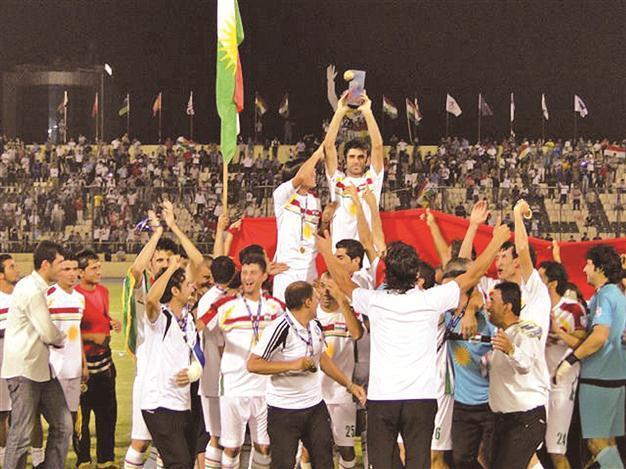KRG footballers envious of Kosovo
James M. Dorsey ISTANBUL - Hürriyet Daily News

Kosovo is taking big steps to be recognized in international football, thanks to open support from players with Kosovar roots, such as Bayern Munich’s Swiss midfielder. Xherdan Shaqiri. The KRG national team (inset) hopes to follow in the footsteps of Kosovo. EPA photo
The Kosovo Football Federation (
KFF) and football-crazy Kosovars are not the only ones anxiously anticipating today’s
FIFA executive committee meeting, which is expected to decide the terms on which Kosovo will be allowed to play international friendlies – so will the Kurdistan Football Association and football-mad Kurds.
Kosovo and Catalonia, which have already been granted permission by FIFA to play international friendlies, are models for the Kurdistan Regional Government (KRG) to whom football is also an important tool in achieving recognition as a nation and statehood.
For the KRG, it is an uphill battle, as Kosovo and Catalonia have a leg up on it. Unlike the KRG, an autonomous region in Iraq that enjoys no recognition from an international community afraid that its independence would further destabilize the Middle East, Kosovo has been recognized by the United States, 36 European nations, including 22 European Union members, and 54 other countries.
Kosovo is a member of the World Bank and the International Monetary Fund. In addition, Kosovo achieved full sovereignty this month with the ending of international supervision imposed after it unilaterally declared independence from Serbia in 2008.
Earlier this month, Albanian international Lorik Cana, along with Swiss internationals Xherdan Shaqiri, Granit Xhaka and Valon Behrami (all of them Kosovar Albanian by origin) wrote a declaration to the president of FIFA, Sepp Blatter, asking him to allow the Kosovo national team to be allowed to play friendly matches. The declaration was also signed by five other Albanian footballers.
For its part, Catalonia’s bid was backed by the Spanish Football Federation.
Strained relations The KRG has none of those assets. The relations between the Kurdish footballing body and the Iraqi federation are strained, with Iraqis weary of Kurdish efforts to strike out on their own. Unable to breakthrough internationally, the KRG organized the 5th VIVA World Cup for nations that FIFA refuses to recognize in June. Competing teams included the KRG, Turkish Cyprus, the Tamils, Western Sahara and Darfur.
In a Sept. 14 letter to FIFA, the KFF welcomed FIFA’s decision in May to grant Kosovo the right to play international friendlies and requested that that right be applicable to “football as a whole, national clubs and teams, men’s and women’s, age categories and senior teams.”
The KFF noted that “Kosovo is not a place where football is embryonic and has to be sustained from a low level. The Football Federation of Kosovo became a member of the FA of Yugoslavia in 1946 with equal rights and the pyramid is complete with leagues and competitions from the top down to the bottom totally in line with FIFA and [European football body] UEFA requirements.”
That is in many ways true for the KRG too, which like Kosovo, has Kurds playing in European clubs. Nonetheless, the hard-nosed, Realpolitik objections to the KRG, for all practical matters a state-in-waiting, following the trail of Kosovo and Catalonia outweigh the moral arguments in its favor.
FIFA’s embrace of Kosovo will nevertheless make the KRG and others all the more determined to achieve equal football status. A statement by Iraqi Kurdish president Masoud Barzani equating sports to politics as a way of achieving recognition adorns Iraqi Kurdistan’s three major stadiums and virtually all of its sports centers and institutions.
“We want to serve our nation and use sports to get everything for our nation. We all believe in what the president said,” said Kurdish Football Federation president Safin Kanabi, scion of a legendary supporter of Kurdish football who led anti-regime protests in Kurdish stadiums during Saddam Hussein’s rule.
“Like any nation, we want to open the door through football. Take Brazil. People know Brazil first and foremost through football. We want to do the same. We want to have a strong team by the time we have a country. We do our job, politicians do theirs. Inshallah, we will have a country and a flag,” said Kurdistan national coach Abdullah Mahmoud Muhieddin.
Crucial step In other words, football may not achieve immediate political and diplomatic recognition but it certainly puts nations in the public eye.
“Our external objective is primarily to project our identity through sports. Many people don’t know our problem or would not be able to find us on a map,” said Sheikh Sidi Tigani, president of the Western Sahara Football Federation.
“Football can change that. We had a French woman visit our refugee camps. When she told children that she was from France, they all replied, ‘Zidane,’” Tigani said in reference to retired star football player. “We’ve replaced the gun with a football,” adds West Saharan national sports director Mohammed Bougleida.
In using football as a tool to further nation and statehood, Kosovars, Kurds and Sahrawis exploit a tradition established at the time that football was introduced in the Middle East and North Africa by the British when the game was a tool to resist European colonialism and assert Arab interests internationally.
“Our success with VIVA demonstrates our ability to govern ourselves. Our goal for now is to be part of FIFA. All languages are represented in FIFA; only Kurdish isn’t, while Blatter claims that football is for everyone. We are human. We want the world to understand Kurdistan’s contribution,” said Kanabi.
kosova,
